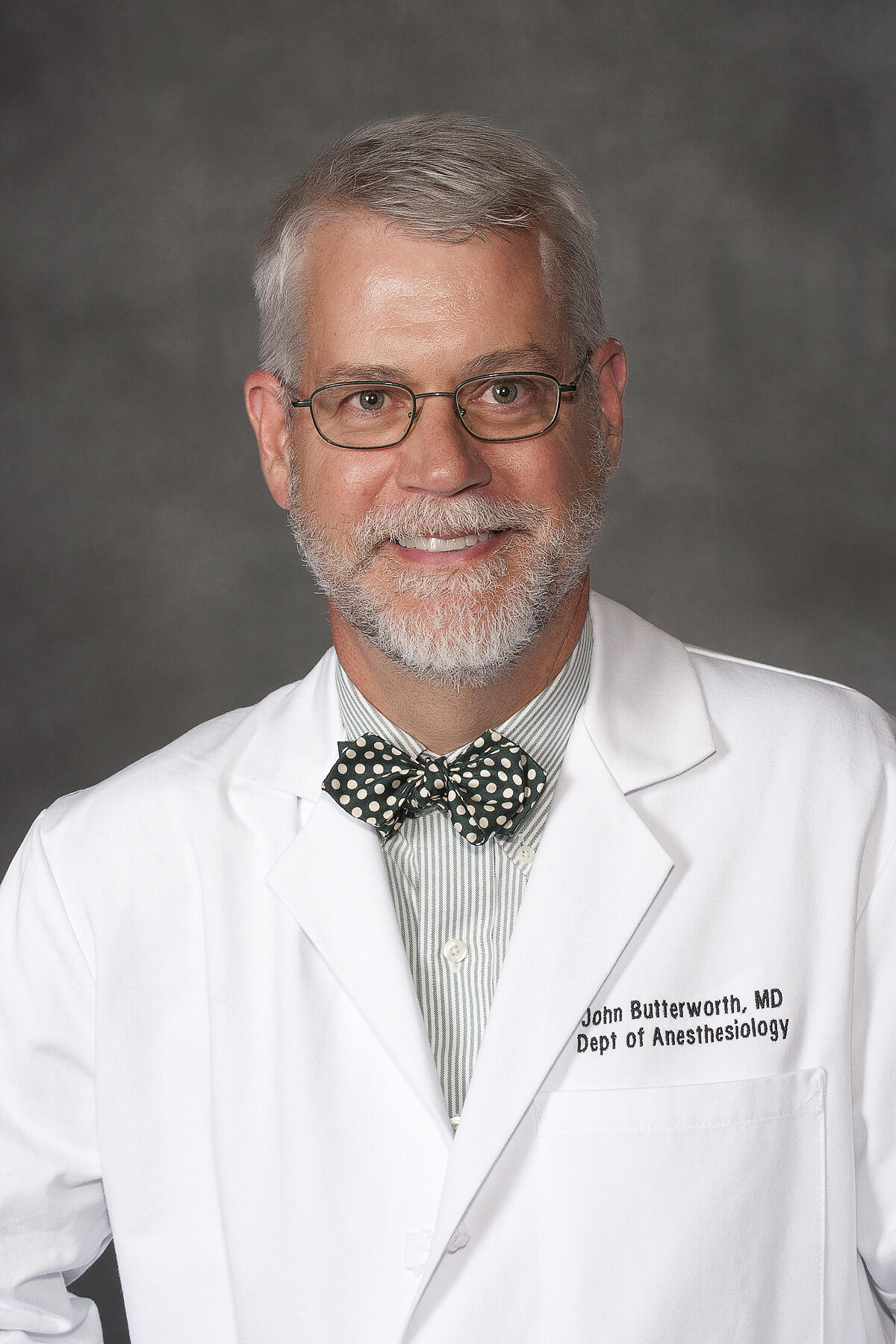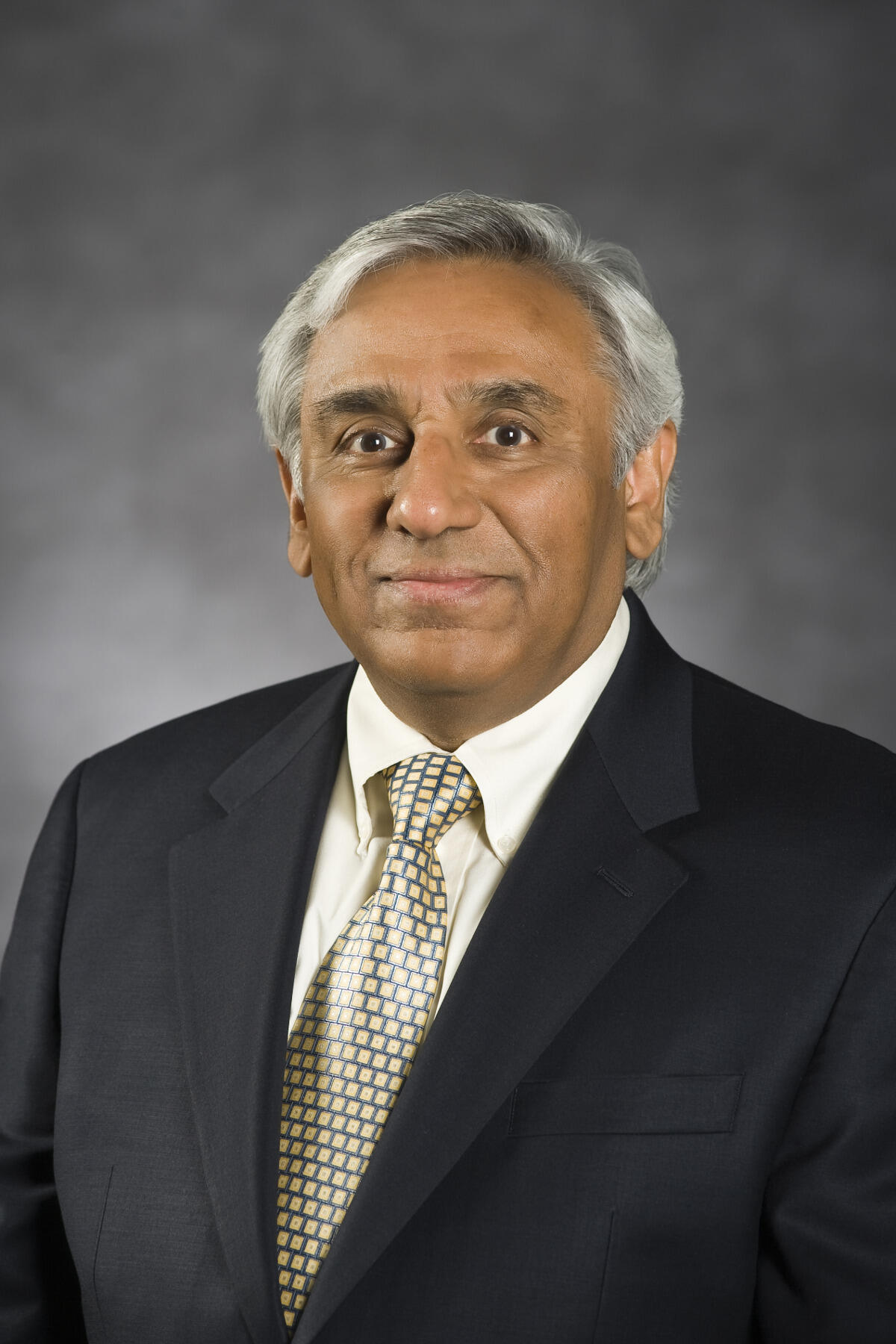Aug. 31, 2017
Faculty and Staff Features for August 2017
Share this story
John F. Butterworth IV, M.D., professor and chair, Department of Anesthesiology, School of Medicine

Butterworth has been named chair of the International Anesthesia Research Society board of trustees. Founded in 1922, the 12,000-member medical society funds more than $1 million in anesthesia research each year and publishes the monthly journal Anesthesia & Analgesia as part of its work to provide a forum for anesthesiology leaders to share information and ideas.
Butterworth’s research focuses on outcomes and drug responses in patients having cardiovascular surgery as well as on pharmacology and toxicity of local anesthetic drugs.
Daniel L. Riddle, Ph.D., professor of physical therapy, School of Allied Health Professions; professor of orthopaedic surgery and rheumatology, School of Medicine

Riddle has been appointed as chair of the National Institutes of Health’s Neurological, Aging and Musculoskeletal Epidemiology Study Section. As chair, Riddle will oversee the study section’s grant review meeting and assure that all grants that are reviewed are reviewed in a fair and timely manner. He will also be in charge of assuring that the scientific and technical merit of each grant is judged appropriately.
“The purpose of all study sections at NIH is to provide a scientific impact score that the various institutes at NIH use to determine who receives NIH funding,” Riddle said.
Lina Maria Ferreira Cabeza-Vanegas, assistant professor, Department of English, College of Humanities and Sciences

Cabeza-Vanegas’ new book “Don’t Come Back” (Mad River Books), is a collection of lyrical and narrative essays exploring identity, family history, and belonging, continually examining what it means to feel familiarity but never really feel at home.
According to the publisher, the book “intermixes translations of Spanish adages and adaptations of major Colombian myths with personal essays about growing up amidst violence, magic and an unyielding Andean sun.”
“Don’t Look Back” was selected from this year’s debut nonfiction to be featured in the Aug. 15 edition of Poet & Writers, and Cabeza-Vanegas was also featured reading an excerpt in the P&W’s podcast.
John C. Powers, Ph.D., associate professor, Department of History, College of Humanities and Sciences

Powers, also assistant director of VCU’s Science, Technology, and Society Program, has been selected by the Chemical Heritage Foundation as the recipient of the Roy G. Neville Prize in Bibliography or Biography for his book, “Inventing Chemistry: Herman Boerhaave and the Reform of the Chemical Arts” (University of Chicago Press).
The Neville Prize recognizes an outstanding monograph or biography in the areas of the chemical and molecular sciences, and is meant to encourage emulation, inspire achievement, and promote public understanding of modern sciences, industries and economies.
“Inventing Chemistry” tells the story of Herman Boerhaave (1668–1738), a Dutch medical and chemical professor whose work reached a wide, educated audience and became the template for chemical knowledge in the 18th century.
Powers’ research focuses on the history of chemistry and alchemy in the 17th and 18th centuries, natural philosophy and medicine in early modern universities, and the development of empirical, experimental, and pedagogical methods in science. His current research focuses on the development of chemical thermometry and the impact of the thermometer on the chemical arts (brewing, ceramics, pharmacy), experimentation, and theories of heat.
Matteo Pangallo, Ph.D., assistant professor, Department of English, College of Humanities and Sciences
Pangallo has authored a new book, “Playwriting Playgoers in Shakespeare’s Theater” (U of Pennsylvania Press).

The book reveals that a small group of largely working- and middle-class amateur writers – who learned most of what they knew about drama from being in the audience – were among the dramatists who wrote for the professional playhouses of early modern London.
It uses familiar and lesser-known print and manuscript plays, as well as literary accounts and documentary evidence, to show how these playgoers wrote and revised to address what they assumed to be the needs of actors, readers, and the Master of the Revels, the government official responsible for censoring plays; how they understood playhouse materials and practices; and how they crafted poetry for theatrical effects. It also situates them in the context of the period's concepts of, and attitudes toward, playgoers' participation in the activity of playmaking.
According to the publisher: “Plays by playgoers such as the rogue East India Company clerk Walter Mountfort or the highwayman John Clavell invite us into the creative imaginations of spectators, revealing what certain audience members wanted to see and how they thought actors might stage it. By reading Shakespeare's theater through these playgoers' works, Matteo Pangallo contributes a new category of evidence to our understanding of the relationships between the early modern stage, its plays, and its audiences. More broadly, he shows how the rise of England's first commercialized culture industry also gave rise to the first generation of participatory consumers and their attempts to engage with mainstream culture by writing early modern 'fan fiction.’”
Lucy Munro, Ph.D., of King’s College London, said the book is “an extremely substantial contribution to the field. ‘Playwriting Playgoers in Shakespeare’s Theater’ has the potential to reconfigure current debates about theatrical authorship and spectatorship, and it also acts as an invaluable primer on a range of neglected material.”
John Venuti, Chief of VCU Police, Assistant Vice President for Public Safety

Virginia Commonwealth University’s Equity and Access Services Title IX steering committee has named Venuti the 2017 Transformative Leader for VCU. The award was established in 2016 “as a way to recognize a member of the VCU community who has made innovations in Title IX strategic and policy approaches, practice, and/or research resulting in operational excellence and who has helped set the tone to promote an environment free from sex-based discrimination, harassment, and violence across the university through exemplary leadership.”
The Title IX Steering Committee unanimously agreed that Venuti would be the 2017 recipient. He was nominated for his exceptional leadership and commitment to sexual assault prevention and response within the university community and in Richmond as well as across the state and nationally.
In 2016, [Venuti] implemented the You Have Options Program, making VCU Police the first campus law enforcement agency in the U.S. to adopt the program. In 2014-15, he served on Gov. Terry McAuliffe's Task Force on Combating Campus Sexual Violence. He has also been responsible for extraordinary efforts to advance inclusion within VCU as well as the Richmond community. In spring 2017, through his partnership with the Richmond Police Department and the LGBTQIA+ community, he planted the Transgender Day of Remembrance tree at VCU Police headquarters.
Venuti has designated a VCU Police investigator as the Title IX liaison for the department; the investigator meets routinely with Title IX staff members for administrative and criminal case coordination.
Gregory Felton, External Relations Officer, VCU Police

The International Association of Campus Law Enforcement Administrators (IACLEA) has honored Felton with the organization’s annual award for innovations in community oriented policing. The award recognizes IACLEA members, teams or departments for “outstanding service and initiatives supporting the effective promotion of the community oriented policing philosophy. New and innovative ideas, demonstrated significant impact of an evidenced-based crime prevention program or initiative, and development of strong community partnerships programs are some of the elements … considered for award selection.”
IACLEA provides education and professional development opportunities to campus safety officers and staff and includes members from 1,175 colleges in 10 countries.
Since 2012, Felton has served as a dedicated officer and liaison for neighborhood associations, business owners and property owners adjacent to VCU. In this role, he developed a model to track and manage the police response to reported problems at student-occupied, off-campus residences. He is also responsible for follow-up visits to speak one-on-one with students. Felton continuously works with off-campus students to help them become good neighbors to city residents; he maintains strong partnerships with residents, merchants and community leaders in Richmond.
Felton routinely collaborates with VCU’s Division of Community Engagement, the Richmond Police Department and the city’s departments of public works and utilities.
Shiv Khanna, Ph.D., Commonwealth Professor, Department of Physics, College of Humanities and Sciences

Khanna will receive the Hind Rattan — or “Jewel of India” — award, which is one of the highest Indian diasporic awards granted annually to non-residents of Indian origin by the NRI Welfare Society of India.
The award is granted to 20 to 30 non-resident Indians living abroad who have made significant contributions. It will be granted at the society’s annual congress on the eve of India’s Republic Day at a ceremony in Thailand in January.
Khanna is a Fellow of the American Association for the Advancement of Science and of the American Physical Society. He has been the recipient of the Distinguished Scholar Award at VCU and has twice been the recipient of the Distinguished Scholar Award of the College of Humanities and Sciences and the Outstanding Faculty Award from the State Council of Higher Education for Virginia. He has co-authored more than 250 research publications, edited six monographs, given more than 100 invited talks including two plenary talks, and chaired or co-chaired several international conferences.
Khanna and his group are involved in theoretical studies of the electronic structure, magnetic properties, and catalytic properties of atomic clusters, cluster assemblies, and nanoscale materials. Along with colleagues, he proposed the concept of “superatoms” that extend the periodic chart to a third dimension and could lead to novel materials with tunable properties and potential for applications in numerous areas.
Subscribe to VCU News
Subscribe to VCU News at newsletter.vcu.edu and receive a selection of stories, videos, photos, news clips and event listings in your inbox.







